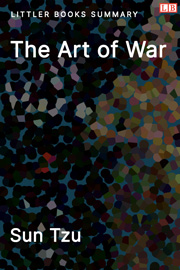Book Description
The classic ancient Chinese military treatise with timeless wisdom.
If You Just Remember One Thing
If you know the enemy and know yourself, you need not fear the result of a hundred battles. This means vi... More
Bullet Point Summary and Quotes
- The Art of War is a treatise on military strategy and tactics written by successful Chinese general Sun Tzu over 2,500 years ago during a period of warring states in China.
- There are five key factors to assess chances of victory:
- Morale - unity of the people and troops.
- Weather - adapt strategy to seasons and conditions.
- Terrain - use geography and positions to your advantage.
- Leadership - wisdom and sincerity builds confidence.
- Doctrine - have constant, unified principles to follow.
- “All warfare is based on deception.”
- “When able to attack, we must seem unable; when using our forces, we must seem inactive; when we are near, we must make the enemy believe we are far away; when far away, we must make him believe we are near.”
- Appear where unexpected and strike vulnerabilities.
- Pick your battles. Meticulously assess preparation, timeliness, and situational factors, and only engage when a victory is all but assured.
- “If fighting is sure to result in victory, then you must fight, even though the ruler forbid it; if fighting will not result in victory, then you must not fight even at the ruler's bidding.”
- Limit the cost of conflict.
- War is an expensive endeavor. Do not prolong conflict as it exhausts troops and drains resources.
- Speed is essential. Wage war swiftly and decisively.
- The best victories are won without conflict or damage.
- “In the practical art of war, the best thing of all is to take the enemy's country whole and intact; to shatter and destroy it is not so good.”
- It's best to win without fighting at all by emphasizing soft power through strategy and tactics.
- Identify new frontiers beyond existing competition. Win by changing the game, not just beating others at their game.
- Victory depends on knowing when to fight, how to handle forces of different strengths, the spirit of the army, preparedness, and military capacity without sovereign interference.
- “If you know the enemy and know yourself, you need not fear the result of a hundred battles. If you know yourself but not the enemy, for every victory gained you will also suffer a defeat. If you know neither the enemy nor yourself, you will succumb in every battle.”
- Coordination and drive from good soldiers will create the energy and momentum needed to win.
- Discover opponents' vulnerabilities, conceal your own, attack weak spots in shifting, indirect ways while leveraging your strongest assets and advantages.
- “The clever combatant imposes his will on the enemy, but does not allow the enemy's will to be imposed on him. By holding out advantages to him, he can cause the enemy to approach of his own accord; or, by inflicting damage, he can make it impossible for the enemy to draw near.”
- A good leader must know the environment well.
- “When you surround an army, leave an outlet free. Do not press a desperate foe too hard.”
- As a leader, you should avoid these five faults:
- “Recklessness, which leads to destruction”
- “Cowardice, which leads to capture”
- “A hasty temper, which can be provoked by insults”
- “A delicacy of honor which is sensitive to shame”
- “Over-solicitude for his men, which exposes him to worry and trouble”
- Lead by example, not by force.
- Occupy sunny and raised positions before the enemy.
- “The natural formation of the country is the soldier's best ally; but a power of estimating the adversary, of controlling the forces of victory, and of shrewdly calculating difficulties, dangers and distances, constitutes the test of a great general.”
- Leaders should have soft skills like integrity, kindness, and empathy.
- Leaders should first treat the soldiers with humanity before enforcing discipline.
- “Regard your soldiers as your children, and they will follow you into the deepest valleys; look upon them as your own beloved sons, and they will stand by you even unto death.”
- “Carefully study the well-being of your men, and do not overtax them.”
- “Rapidity is the essence of war: take advantage of the enemy's unreadiness, make your way by unexpected routes, and attack unguarded spots.”
- “You will not succeed unless your men have tenacity and unity of purpose, and, above all, a spirit of sympathetic cooperation.”
- “Place your army in deadly peril, and it will survive; plunge it into desperate straits, and it will come off in safety. For it is precisely when a force has fallen into harm's way that is capable of striking a blow for victory.”
- “No ruler should put troops into the field merely to gratify his own spleen; no general should fight a battle simply out of pique.”
- Use espionage or research to understand competitors' strengths and weaknesses.
- “What enables the wise sovereign and the good general to strike and conquer, and achieve things beyond the reach of ordinary men, is foreknowledge… Hence the use of spies… Spies are a most important element in war, because on them depends an army's ability to move.”
The Art of War: Resources
- Download this summary and 173+ other top nonfiction book summaries in one book (PDF, eBook, DOCX)
- Buy the book
